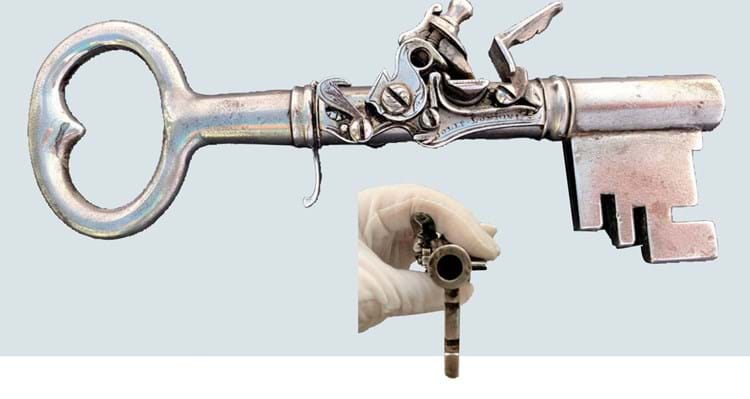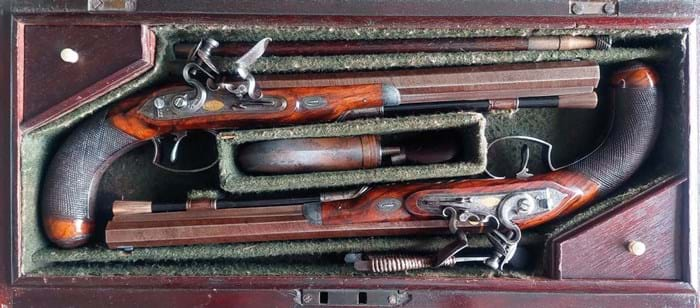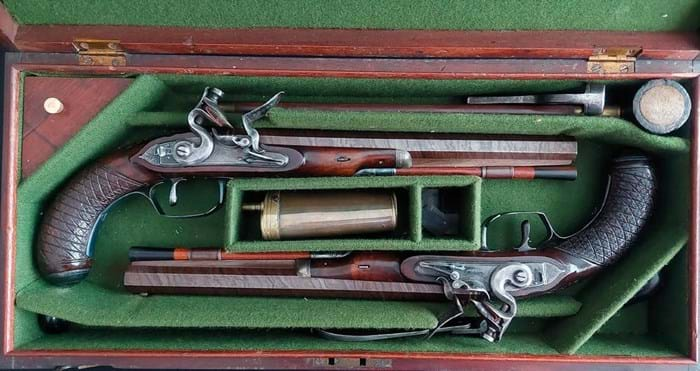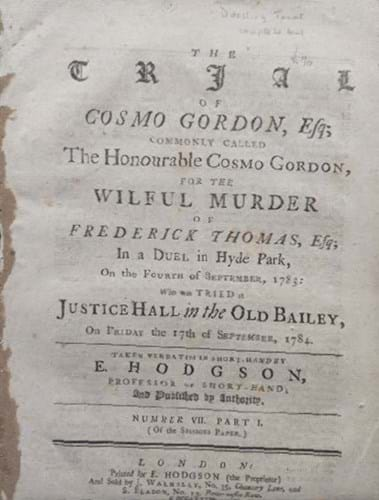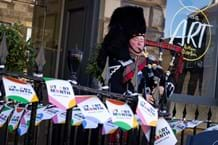One of the best performers in an auction mostly dedicated to firearms that were Irish or had an Irish connection was a very unusual flintlock pistol actually by a London maker.
The all-steel 80-bore pistol constructed in the form of a key, the workings fully exposed, dated from c.1715. Offered in the Bloomfield (15% buyer’s premium) sale in Belfast on October 31, it took £10,000 against a guide of £2000-3000.
Possibly intended for use by a jailer, the maker was George Edward Dolep, son of the famous Andreas/ Andrew Rheinhold Dolep, creator of innovative firearms.
In 1710 he married Mary, daughter of John Tittensor, gun barrel forger. Dolep Jr is recorded as ‘Gunsmith over against the Plow & Harrow in St Martins Lane’ in 1713, the same year he was made free of the Gunmakers Company. Appointed Gentleman Armourer to George I in 1715, he died in 1717.
Andrew Dolep was gunmaker to Prince George of Denmark and came to England after the prince married Princess Anne of England (Queen Anne in 1702-14). His inventive firearms included a sporting gun sold at American saleroom Rock Island Auction in August last year for a premium-inclusive $23,500 that can be used either as a traditional black powder ignition flintlock or as an air rifle powered by a ball shaped reservoir of compressed air.
Another ingenious Dolep Sr creation, a breech-loading 22-bore break-action flintlock holster pistol made c.1690, took £22,000 at Bonhams in 2018.
Happy to share
The key pistol was one of 285 lots dispersing the Leslie Martin Collection of Antique Firearms. Martin (1946-2018) was born on a farm in County Antrim and spent his working career in the Ministry of Agriculture, later to become the Department of Agriculture.
His family said: “Always a dedicated worker, Leslie spent his short leisure hours pursuing many hobbies such as trains and railways, photography (including cine photography), record collecting (along with gramophones and record players), but his one true passion was gun collecting.
“Beginning from the age of about 15, he began tentatively collecting until he became a serious collector. It wasn’t just the arms, it was the history behind them: the source, maker, the family who commissioned them, etc.”
When Martin retired, “he had so much more time to research his passion and would spend many happy hours on the computer in pursuit of as much information as he could glean. Emails would fly to and fro between him other collectors, many of whom became firm friends.”
During this era of his life Martin began to specialise more in Irish guns and their makers. “He never selfishly kept his knowledge to himself but would be only too happy to help out other collectors,” his family added.
Seven shots

A 32-bore Irish hand-rotated seven-shot revolving carbine by Wm. & Jn. Rigby, Dublin, £39,000 at Bloomfield.
The selling rate was high, although with punchy estimates many lots got way below the guides.
Top price at £39,000 (estimate £45,000-50,000) was for one of the Irish weapons, another highly unusual firearm: a ‘very rare’ 32- bore Irish hand-rotated seven-shot revolving carbine by Wm. & Jn. Rigby, Dublin, c.1838. Fitted with a spring bayonet, it measured 2ft 4in overall and featured an 11in octagonal barrel group arranged as a cluster of six around the seventh central barrel.
It was originally sold for £34.13.0 to S Crosthwaite, 1838. Samuel Crosthwaite took over Lodge Mills, Bagenalstown, Dunleckey, Co Carlow in 1837, making potato starch. The Bloomfield catalogue noted that in 1838-9 there was a potato failure (but not the famine proper). The mill was on the Barrow canal, to ship out the starch/flour (and maybe ship in potatoes) - maybe his position meant he needed a multi-fire self-defence piece in 1838. When the famine came proper, he was back to Rigby, this time for six police-type carbines with bayonets.
The Rigby company officially started in 1775, as John Rigby & Co. In 1818 the founder died and the firm passed to his son William, who invited his brother, John Jason, to join him, and the company name changed to W&J Rigby as early as 1823.
Siege link
Another notable weapon with an Irish connection was an early flintlock sword pistol, perhaps a Dutch piece, reputably used during the famous Siege of Derry, 1689.
The horn-handled flintlock pistol dating from c.1650 was married up with a sword in c.1675 (possibly by a tinker), with brass-work addition to act as a blade stabiliser. The brass has been later struck with the Donegal census DL 2234.
With an overall length of 3ft 3in, the sword blade is inscribed with the date +1 5 1 5+ and features the Passen Wolf mark commonly used by the Solingen blade manufacturer.
It belonged to the Hart family in the Derry/Donegal area who had played a prominent part in the Siege of Derry. Colonel Henry Hart 1651-1711/12 is believed to have commanded the Fort of Culmore.
Estimated also at £45,000- 50,000, it took £38,000 (£33,060).
Ireland to US
A local link in the form of an ‘immaculate’ pair of Irish 34- bore duelling pistols by Robert McCormick of Belfast, 1793, sold for £27,000 (estimate £32,000-35,000).
The original mahogany case bore an oval plaque signed Lieu. J.G. Ranken. The original owner seems to be a George Ranken of Belfast who is described as an official serving in the East India Company. His father appears to have been a Belfast banker, magistrate, and commanding officer (captain) of the Belfast Yeomanry Infantry (1798) whose name also appears in connection with the Belfast Cavalry (1797). Presumably George also served in this unit.
Robert McCormick was also listed as the maker of another set of pistols but this time originating from Dublin: 38-bore flintlock campaign pistols, c.1796. Estimated at £20,000-22,000, the set sold for £18,000.
After Belfast and Dublin, McCormick moved to the States and leased the Globe Mills, Philadelphia, in 1798 to produce firearms. He was contracted by the US government for muskets that same year. However, he did not finish a contract made in 1799 because he was thrown into a debtors’ prison in two years later. That contract was finished by his employee James Haslett, a familiar name for American gun collector Haslett went on to run the Virginia Manufactory.
A Robert McCormick US Contract ‘Horseman’ flintlock pistol sold for a premium-inclusive $14,950 at Rock Island Auction in May 2021. Such weapons were among the earliest known pistols ever delivered officially to the US government.
Duel purpose
The one Bloomfield lot that was not a firearm performed well, taking £1200, four times the top estimate. It comprised the complete issue of the Sessions Paper devoted entirely to The Trial of Cosmo Gordon, Esq; commonly called the Honourable Cosmo Gordon, for the Wilful Murder of Frederick Thomas, Esq; in a Duel in Hyde Park, on the Fourth of September, 1783.
Gordon was tried at the Justice Hall in the Old Bailey, on Friday, September 17, 1784.
This 18pp record was Taken Verbatim in Short-Hand by E. Hodgson, Professor of Short-Hand; and Published by Authority. Number VII. Part I. London, for E. Hodgson, 1784.
Gordon, fourth son of William Gordon, 2nd Earl of Aberdeen, has been described as a privileged bon vivant. An unpopular commander in the American War of Independence, this duel (and a previous court martial for Gordon) resulted from a fierce dispute between him and Thomas, his subordinate in the Brigade of Guards, about Gordon’s conduct in 1780.
The 1783 trial was a foregone conclusion - Gordon was found not guilty after the jury deliberated for all of 10 minutes.


